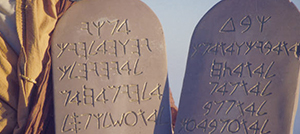“No soldier on service entangleth himself in the affairs of this life, that he may please him who enrolled him as a soldier. And also if a man contend in the games, he is not crowned except he have contended lawfully.” “Know ye not that they who run in a race all run, but one receiveth the prize? So run that ye may obtain. And every man that striveth for the mastery is temperate in all things. Now they do it to obtain a corruptible crown; but we an incorruptible crown. I, therefore, so run, not as uncertainly; so fight I, not as one beateth the air: but I keep my body under and bring it into subjection, lest that by any means, when I have preached to others, I myself should be a castaway.” 2 Tim. 2:4, 5; I Cor. 9:24-27.
THESE EARNEST EXHORTATIONS of the faithful Apostle to the Gentiles were most clearly illustrated in his noble course of life. He shunned no danger, shrank from no labor or reproach or privation, and bravely and cheerfully endured hardness and suffered the loss of all things temporal that he might win Christ and be approved of him. As we look upon such a course and consider the fortitude and the strength of character necessary so to run, we may well conclude, that, except we be similarly supplied with the help of divine grace, we shall not be able to persevere to the end.
Paul sped along in that race, not in his own strength, but in the strength which God supplied. And the promise of such aid is none the less ours than it was his. The divine grace is imparted to us through the exceeding great and precious promises of God inspiring us with new and glorious hopes beyond the wreck and ruin of the present order of things. Permitting our minds to dwell upon these we see in the now rapidly approaching dawn of the day of Christ a new heavens and a new earth; and by faith we sit together with Christ in the heavenly places of glory and honor, and together with him are crowned with immortality. By faith we see also the blessed privileges of such an exalted station, and the divinely appointed work in which we will be engaged together with Christ.
A weary, groaning creation awaits our ministry of power; and in the proportion that we partake of the loving, pitiful spirit of our Master will we be able to appreciate such a privilege. If we are cold and selfish and untouched with the feeling of earth’s infirmities; if the woes of our fellow-men awaken in us no feelings of sympathy and of desire to help, we can have no appreciation of the prize of our high calling. But if, on the contrary, we love our fellow-men as God and Christ loved them; if we pity their weakness and remember the hereditary cause, we will lay not all their sins and short-comings to their personal charge. We will be anxious to clear their minds from the mists of ignorance and superstition and the bias of prejudices; and to help them to more rational modes of thought and action, and to better ideas of life and its relationships and responsibilities. We will seek to gather out of their pathway all the stumbling stones whereby so many are now precipitated into a course of vice; and to cast up a highway of holiness upon which no lion of intemperance or other evil thing may be found. We will be ready to declare to them all the everlasting gospel of salvation, and to open their deaf ears to hear and their blind eyes to see the salvation of God. If such are our sympathies toward the world of sinners which God so loved, then we are able to appreciate to some extent the privileges of our high calling, when, as joint-heirs with Christ in His Kingdom and power, we shall be able to put into actual execution all our benevolent desires for the uplifting and healing of our sin-sick world.
Any who have ever experienced the joy of converting even one sinner from the error of his ways, or of establishing the feet of one of Christ’s little ones, may have some idea of the joy that will attend the ministry of the saints when they are fully endued with divine power for the great work of their Millennial reign; for they will not be hampered as now, but every effort put forth will be a success.
The privilege of such a blessed work, even aside from the precious thought of association with Christ and of our blessed relationship to the Father, is a wonderful inspiration to every benevolent heart which, even now, would fain take upon itself the burdens which it sees oppressing others whom they love and pity.
But though inspired with such a hope of benevolent service for the whole world in God’s appointed time, and of blessed association with Christ in it, we must remember that we have yet to “strive” for the prize of our high calling; and not only so, but we must strive “lawfully.” We must run our race, not only with diligence, energy, patience and perseverance, but we must run according to the prescribed rules, as otherwise our labor will be in vain. First of all we must enter into this course by the “strait gate”—by a full consecration of our all to the Lord, after exercising faith in the precious blood of Christ as our ransom price. If we do not enter by this door, we are not counted in the race for the prize, no matter how zealously we run. This is the first rule for those who would so run as to obtain. “Enter ye at the strait gate; … because strait is the gate and narrow is the way that leadeth unto life, and few there be that find it.”
Having so entered, the Apostle now urges that we be filled with the Spirit of Christ, that we may not be led by the desires of the flesh away from God and from the course which he has marked out. Then the body, the human nature, must be kept under the control of the new mind, the spirit of Christ in us. Its ambitions and hopes and desires must be kept down; and the only way to do this is to keep filled with the spirit. “Walk in the spirit, and ye shall not fulfil the desires of the flesh.”—Gal. 5:16.
If we are filled with the spirit—with the same mind that was in Jesus Christ—we will act from the same motives: it will be our meat and drink to do the Father’s will. We will engage in his work because we love to do it, even aside from the inspiring prize at the end of our course. Christ was so full of sympathy with humanity, and so thoroughly of one mind with the Father, that he could not do otherwise than to devote his life to the good of others. Yet in all his labors he strictly observed the divine plan. Though, like the Father, he loved the whole world, he did not go beyond Israel to bless the Gentiles with his ministry, because the appointed time for that work had not yet come.
He observed God’s times and seasons and methods. He never recklessly exposed his life until from the prophets he recognized that his hour had come to be delivered into the hands of his enemies. He taught his disciples not to go into the way of the Gentiles until the due time; and then he sent them forth. He did not make long prayers on the street corners to be heard of men, nor exhort the multitude with noisy harangue; as the prophet indicated, he did not lift up his voice nor cry aloud in the streets. (Isa. 42:2.) He chose God’s methods which are rational and wise, and which are effective in selecting out from among men the class which he desires to be heirs of the promised Kingdom. Let those who would so run as to obtain the prize, mark these footprints of the Master, and be filled more and more with his spirit.
If so filled with the same mind that was in Christ Jesus, we, like him, will desire to be as free as possible from entangling earthly affairs, and to have our time as free as possible for the Lord’s service, and then to devote all energy, ability and effort to that service.
To have the mind of Christ is indeed the one requirement of lawful striving—a mind which humbly and faithfully submits itself to the will of God as expressed in his great plan of the ages, and which devotes all energy to the accomplishment of his will, because of an intelligent appreciation of the ends he has in view.












